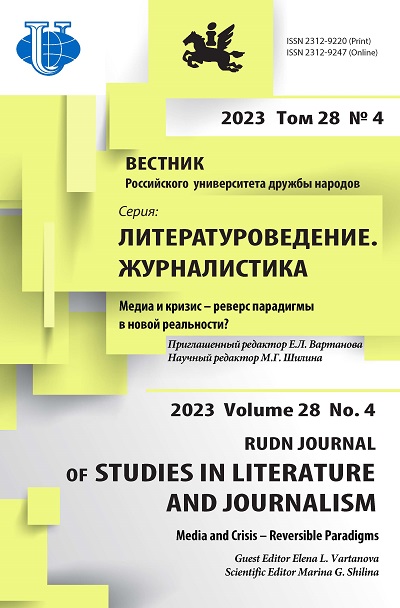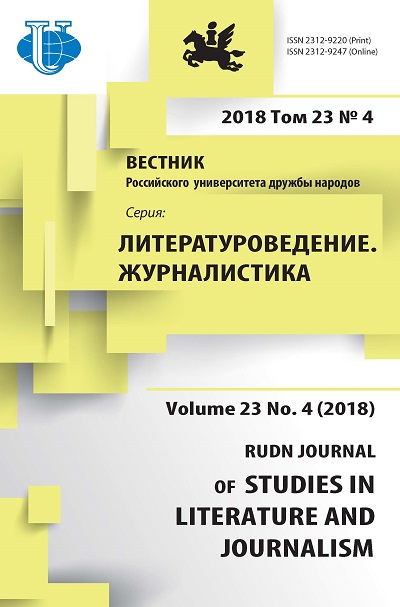The key topics of TV show “Let them talk”
- Authors: Algavi L.O.1, Volkova I.I.1, Kadirova S.N.1, Rastorgueva N.E.1
-
Affiliations:
- Peoples’ Friendship University of Russia
- Issue: Vol 23, No 4 (2018)
- Pages: 441-452
- Section: JOURNALISM
- URL: https://journals.rudn.ru/literary-criticism/article/view/20452
- DOI: https://doi.org/10.22363/2312-9220-2018-23-4-441-452
Cite item
Full Text
Abstract
The article presents the results of the thematic analysis of the TV talk show “Let them talk” (within the season 2017) - the highest rated program of the First Channel. The main goal is to identify the real values promoted by its creators and participants to the public. The relevance of the study is explained by the fact that the federal television in modern Russia reproducts the socially significant patterns of thinking and behavior of citizens in an attempt to unite society on the basis of common values. If the program “Let them talk”, according to its authors’ attitudes, brings to discussion the sensible subjects for “all of the Russians without exception”, there is a reason to discover and comprehend the explicit and implicit subjects using the content analysis and thematic analysis. As a result of our analysis we identified the values’ paradox: though the word “child” was the most mentioned in season 2017 the narrative role attributed to the children in the TV-show in question is to be “Me Guffin” (A. Hitchcock’s terminology). The substance of the above-mentioned paradox is that the child itself is important only as a tool for achieving the goal and at the same time the child is often the reason of conflicts between the show participants. The main results of the study were presented in english as a paper “Let Them Talk as Encyclopedia of Russian Life: Latent Accursed Questions on Russian Television (2017)” for the the Eighth International Scientific and Practical Conference “Modern problems of linguistics and didactics: Interdisciplinary approach in the humanities and social sciences”.
About the authors
Leila Omarovna Algavi
Peoples’ Friendship University of Russia
Author for correspondence.
Email: algawy@hotmail.com
Candidate of Philology, Associate Professor of the Department of Theory and History of Journalism, Faculty of Philology, Peoples’ Friendship University of Russia (RUDN University).
10 Miklukho-Maklaya St., bldg. 2, Moscow, 117198, Russian FederationIrina Ivanovna Volkova
Peoples’ Friendship University of Russia
Email: irma-irma@list.ru
Doctor of Philology, Professor of the Department of Mass Comunications, Faculty of Philology, Peoples’ Friendship University of Russia (RUDN University).
10 Miklukho-Maklaya St., bldg. 2, Moscow, 117198, Russian FederationShuanat Nabievna Kadirova
Peoples’ Friendship University of Russia
Email: skadyrova@yandex.ru
Candidate of Philology, Assistant Professor of the Department of Theory and History of Journalism, Faculty of Philology, Peoples’ Friendship University of Russia (RUDN University). Contacts
10 Miklukho-Maklaya St., bldg. 2, Moscow, 117198, Russian FederationNatalya Evgenevna Rastorgueva
Peoples’ Friendship University of Russia
Email: rastorgueva_ne@pfur.ru
Candidate of Philology, Assistant Professor of the Department of Theory and History of Journalism, Faculty of Philology, Peoples’ Friendship University of Russia (RUDN University).
10 Miklukho-Maklaya St., bldg. 2, Moscow, 117198, Russian FederationReferences
- TV, Internet, gazety, radio: doveryaj, no proveryaj? [TV, Internet, newspapers, radio: trust, but check?] // Oficial’nyj sajt VCIOM. Available from: URL: https://wciom.ru/index. php?id=236&uid=115679 (accessed: 30.08.2018).
- Belinsky V.G. Sochineniya Aleksandra Pushkina. Statya 9. [Works of Alexander Pushkin. Article 9]. Biblioteka Maksima Moshkova. Available from: URL: http://az.lib.ru/b/belinskij_w_g/ text_0200.shtml (accessed: 30.08.2018).
- Kuznecov G.V. Tak rabotayut zhurnalisty TV [This is how TV journalists work]. Moscow: Izdatel’stvo Moskovskogo universiteta, 2000. 224 p.
- Mogilevskaya Eh.V. Tok-shou kak zhanr TV: proiskhozhdenie, raznovidnosti, priemy manipulirovaniya [Talk show as a TV genre: origins, varieties, manipulation techniques] // Relga. Available from: URL: http://www.relga.ru/Environ/WebObjects/tgu-www.woa/wa/%20Main?t extid=1114&level1=main&level2=articles (accessed: 30. 08.2018).
- Boreckij R.A., Cvik V.L. Zhanry televizionnoj zhurnalistiki [Genres of television journalism] // Televizionnaya zhurnalistika / G.V. Kuznecov i dr. Moscow: Izd-vo Mosk. un-ta: Nauka, 2005. Pp. 195—196.
- Cvik V.L. Televizionnaya zhurnalistika: teoriya, istoriya, praktika [Television journalism: theory, history, practice]. Moscow: Aspekt Press, 2004. Pp. 254—258.
- Il’chenko S.N. Transformaciya zhanrovoj struktury sovremennogo otechestvennogo tele-kontenta: aktualizaciya igrovoj prirody televideniya [Transformation of the genre structure of modern domestic television content: actualization of the game nature of television]: dis.. d-ra fil. nauk. Moscow, 2012. 364 s.
- Gulenko P.V., Dolgova Yu.I. Problemy klassifikacii sovremennyh teleperedach: sushchnostnye harakteristiki formata “tok-shou” [The problems of the classification of modern TV programs: the essential characteristics of the “talk show” format]. RUDN Journal of Studies in Literature and Journalism. 2016. No. 3. Pp. 102—110.
- VCIOM nazval samye populyarnye teleperedachi 2017 goda u rossiyan [RPORC named the most popular TV programs of 2017 among Russians]. Telesputnik. Available from: URL: http://www. telesputnik.ru/materials/tsifrovoe-televidenie/news/vtsiom-nazval-samye populyarnyeteleperedachi-2017-goda-u-rossiyan/ (accessed: 30.08.2018).
- Lunt P., Stenner P. The Jerry Springer Show as an emotional public sphere // Media, Culture & Society. 2005. Vol. 27. Issue 1. Pp. 59—81.
- Let them talk // Channel one. URL: https://www.1tv.ru/shows/pust-govoryat (accessed: 30.08.2018).
- Shulman E.M. Skazka o rybake i rybke skandal kak otrazhenie menyayushchejsya socialnoj normy [Tale of a Fisherman and a Fish: Scandal as a reflection of a changing social norm]. Ekaterina Shulman Youtube Channel. Available from: URL: https://ww w.youtube.com/ watch?v=yTSClJAmrWc (accessed: 23.08.2018).
- Boyatzis R.E. Transforming qualitative information: thematic analysis and code development. California: Sage Publications, 1998. 184 p.
- Zhiznennye prioritety rossiyan: sem’ya, den’gi ili tvorchestvo? // VCIOM official site. URL: https://wciom.ru/index.php?id=236&uid=116264 (accessed: 30.08.2018).
- Chernikova N.V. Otrazhenie bazisnyh cennostej sovremennogo rossijskogo obshchestva v konceptualnoj i yazykovoj kartinah mira [Reflection of the basic values of modern Russian society in the conceptual and linguistic pictures of the world]. Uchenye zapiski tambovskogo regionalnogo otdeleniya rossijskogo soyuza molodyh uchenyh. V. 2. Perspektivy razvitiya nauchnogo znaniya v XXI veke: materialy Vseros. nauch.-prakt. konf. Tambov: TGU im. G.R. Derzhavina, 2014. Pp. 175—183.
- Verjovsky A.M. (ed.). Yazyk moj problema ehtnicheskoj i religioznoj neterpimosti v rossijskih SMI [My language.. The problem of ethnic and religious intolerance in the Russian media]. Мoscow: RОО “Center ‘Panorama’”, 2002. 200 p.
- Fedorov A. et al. Directions, goals, tasks, author’s concepts of audiovisual media interpretations of the topic of the school and university in the Russian cinema (1992—2017). Nauchnaya ehlektronnaya biblioteka “Kiberleninka”. Available from: URL: https://cyberleninka.ru/article/v/ directions-goals-tasks-authors-concepts-of-audiovisual-media-interpretations-of-the-topic-ofthe-school-and-university-in-the-russian-cinema (accessed: 30.08.2018).
- Francois Truffaut. Hitchcock. London: Faber & Faber, 2017. 368 p.
- Dolar M. Hitchcock’s objects // Everything You Always Wanted to Know about Lacan (But Were Afraid to Ask Hitchcock) / eds. Žižek, S. [et al.]. London; New York: Verso, 1992. 279 р.
















